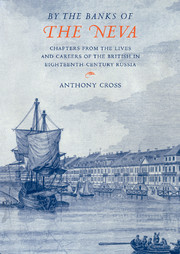 'By the Banks of the Neva'
'By the Banks of the Neva' Book contents
- Frontmatter
- Contents
- List of illustrations
- Preface
- Note on Russian dates
- Introduction
- 1 The colony by the banks of the Neva
- 2 Factory matters and ‘the honourable of the Earth’
- 3 ‘In Anglorum templo’: the English Church and its chaplains
- 4 ‘Doctors are scarce and generally Scotch’
- 5 ‘Sur le pied anglais’: shipbuilders and officers in the Russian navy
- 6 ‘Necessary foreigners’: specialists and craftsmen in Russian service
- 7 Masters of the Arts
- 8 ‘Out of curiosity’: tourists and visitors
- Epilogue
- Notes
- Index
8 - ‘Out of curiosity’: tourists and visitors
Published online by Cambridge University Press: 15 December 2009
- Frontmatter
- Contents
- List of illustrations
- Preface
- Note on Russian dates
- Introduction
- 1 The colony by the banks of the Neva
- 2 Factory matters and ‘the honourable of the Earth’
- 3 ‘In Anglorum templo’: the English Church and its chaplains
- 4 ‘Doctors are scarce and generally Scotch’
- 5 ‘Sur le pied anglais’: shipbuilders and officers in the Russian navy
- 6 ‘Necessary foreigners’: specialists and craftsmen in Russian service
- 7 Masters of the Arts
- 8 ‘Out of curiosity’: tourists and visitors
- Epilogue
- Notes
- Index
Summary
By the beginning of the eighteenth century the Grand Tour was well and truly established as a highly recommended, if not an altogether indispensable, part of a young gentleman's education. The classic itinerary took the tourist across the Channel to Paris and south to Italy – and Rome, ‘the famousest place in the world and the first motive that induced me to become a traveller’. The classic actors in the rite were the scion of a noble house, freshly emerged from public school or, indeed, in fewer cases, from university, and his tutor, more likely than not an Oxbridge don, a man of assumed maturity and probity, a Mentor to an English Telemachus. The pupil was supposedly keen to add a smattering of modern languages, primarily of French, to his school Latin, to refine his taste and broaden his knowledge, and to return to become an enlightened landowner, parliamentarian or leader. The travelling tutor, or bearleader, as he was commonly called, was to instruct and guide and to guard his pupil from the perils and snares of the world. Not unexpectedly, the reality frequently fell far short of the ideal. Many a callow youth preferred to tilt the eighteenth-century balance between utility and pleasure decidedly in favour of the latter, when it was interpreted as gambling, gallivanting and whoring, while the poor tutor as often found that the world he confronted was very different from the world of books he was accustomed to inhabit. Parents, moralists and critics were not slow to count the costs and enumerate the disadvantages that the tour was seen to bring.
- Type
- Chapter
- Information
- 'By the Banks of the Neva'Chapters from the Lives and Careers of the British in Eighteenth-Century Russia, pp. 331 - 391Publisher: Cambridge University PressPrint publication year: 1996


